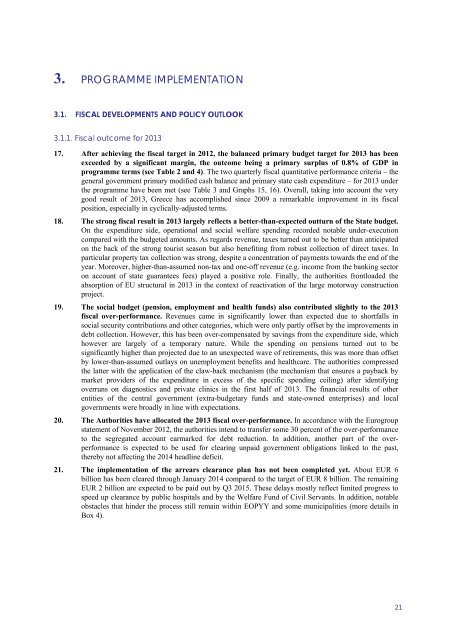ocp192_en
ocp192_en
ocp192_en
Create successful ePaper yourself
Turn your PDF publications into a flip-book with our unique Google optimized e-Paper software.
3. PROGRAMME IMPLEMENTATION3. PROGRAMME IMPLEMENTATION3.1. FISCAL DEVELOPMENTS AND POLICY OUTLOOK3.1.1. Fiscal outcome for 201317. After achieving the fiscal target in 2012, the balanced primary budget target for 2013 has be<strong>en</strong>exceeded by a significant margin, the outcome being a primary surplus of 0.8% of GDP inprogramme terms (see Table 2 and 4). The two quarterly fiscal quantitative performance criteria – theg<strong>en</strong>eral governm<strong>en</strong>t primary modified cash balance and primary state cash exp<strong>en</strong>diture – for 2013 underthe programme have be<strong>en</strong> met (see Table 3 and Graphs 15, 16). Overall, taking into account the verygood result of 2013, Greece has accomplished since 2009 a remarkable improvem<strong>en</strong>t in its fiscalposition, especially in cyclically-adjusted terms.18. The strong fiscal result in 2013 largely reflects a better-than-expected outturn of the State budget.On the exp<strong>en</strong>diture side, operational and social welfare sp<strong>en</strong>ding recorded notable under-executioncompared with the budgeted amounts. As regards rev<strong>en</strong>ue, taxes turned out to be better than anticipatedon the back of the strong tourist season but also b<strong>en</strong>efiting from robust collection of direct taxes. Inparticular property tax collection was strong, despite a conc<strong>en</strong>tration of paym<strong>en</strong>ts towards the <strong>en</strong>d of theyear. Moreover, higher-than-assumed non-tax and one-off rev<strong>en</strong>ue (e.g. income from the banking sectoron account of state guarantees fees) played a positive role. Finally, the authorities frontloaded theabsorption of EU structural in 2013 in the context of reactivation of the large motorway constructionproject.19. The social budget (p<strong>en</strong>sion, employm<strong>en</strong>t and health funds) also contributed slightly to the 2013fiscal over-performance. Rev<strong>en</strong>ues came in significantly lower than expected due to shortfalls insocial security contributions and other categories, which were only partly offset by the improvem<strong>en</strong>ts indebt collection. However, this has be<strong>en</strong> over-comp<strong>en</strong>sated by savings from the exp<strong>en</strong>diture side, whichhowever are largely of a temporary nature. While the sp<strong>en</strong>ding on p<strong>en</strong>sions turned out to besignificantly higher than projected due to an unexpected wave of retirem<strong>en</strong>ts, this was more than offsetby lower-than-assumed outlays on unemploym<strong>en</strong>t b<strong>en</strong>efits and healthcare. The authorities compressedthe latter with the application of the claw-back mechanism (the mechanism that <strong>en</strong>sures a payback bymarket providers of the exp<strong>en</strong>diture in excess of the specific sp<strong>en</strong>ding ceiling) after id<strong>en</strong>tifyingoverruns on diagnostics and private clinics in the first half of 2013. The financial results of other<strong>en</strong>tities of the c<strong>en</strong>tral governm<strong>en</strong>t (extra-budgetary funds and state-owned <strong>en</strong>terprises) and localgovernm<strong>en</strong>ts were broadly in line with expectations.20. The Authorities have allocated the 2013 fiscal over-performance. In accordance with the Eurogroupstatem<strong>en</strong>t of November 2012, the authorities int<strong>en</strong>d to transfer some 30 perc<strong>en</strong>t of the over-performanceto the segregated account earmarked for debt reduction. In addition, another part of the overperformanceis expected to be used for clearing unpaid governm<strong>en</strong>t obligations linked to the past,thereby not affecting the 2014 headline deficit.21. The implem<strong>en</strong>tation of the arrears clearance plan has not be<strong>en</strong> completed yet. About EUR 6billion has be<strong>en</strong> cleared through January 2014 compared to the target of EUR 8 billion. The remainingEUR 2 billion are expected to be paid out by Q3 2015. These delays mostly reflect limited progress tospeed up clearance by public hospitals and by the Welfare Fund of Civil Servants. In addition, notableobstacles that hinder the process still remain within EOPYY and some municipalities (more details inBox 4).21


